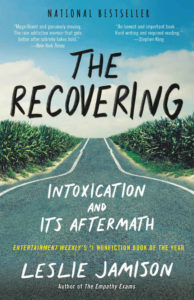
This is an absolutely fascinating read inside the head of a recovering alcoholic. If you’ve ever known anyone (haven’t we all) who had an alcohol problem (or even a drug problem) and wanted to understand what prompted them to reckless and usually irresponsible actions, this author did just that in her memoir. But it’s not just about what goes on inside the head of a person who makes a conscious choice to drink or not to drink, this book is so much more.
The Recovering: Intoxication and Its Aftermath
Warning: this book contains graphic content and adult language in every chapter. While I generally avoid reviewing books that include graphic scenes and adult language, I think this book can help a lot of people, so I’m making an exception.
I almost didn’t read this book due to the number of one star reviews on amazon, but the book was highly recommended to me. In deciding whether or not to read it, I noticed that most of those one and two star reviews were written by folks who admitted they never finished the book. However, I think that in order to fully grasp the concept an author is trying to portray, you must actually read the whole book to the end before judging. I’m glad I decided to give the book a try, as once I started reading, I couldn’t stop.
This book isn’t just about the author and her life – even though it’s called a memoir. It also gets inside the head of what a person is thinking, experiencing, and how she makes her choices to drink. The lack of self control, the hiding of the bottles, the reckless actions, the destructive relationships, all are explained step by step inside the mind of the addict.
This book delves further still beyond an individual’s problem, and offers the mind opening concept that perhaps aspects of our society make the problem of addiction worse. The author provides a very fascinating analysis of how people (and laws) treat drug abusers differently based on their culture, and how addicts’ success or failure in treatment may have little to do with their willingness to get help, but the resources available to them based on who they are and where they live.
The author also compares different authors who were known addicts and how their writings reflected their lives as a result or their addictions. Her examples demonstrate it is more accepted to be a man and an alcoholic versus a woman, and how alcoholics from different racial and economic backgrounds are treated differently. The deleterious result is that many people may be screaming for help on the inside, but due to judgments placed on them, struggle to achieve sobriety.
The first part of the book recounts the author’s reckless life of drinking, the thoughts that crossed her mind from the minute she woke up until the moment she felt it acceptable to have a drink. She describes the planning and scheming it took for her to secure enough alcohol for the evening’s attempt to run away from life, to the blackouts that she can only recall from the descriptions told to her by others who witnessed her then. The second part of the book, almost a dull boring life compared to the first, is the recovering: the hour by hour struggle of making a conscious effort to not drink, to go to a meeting, and the constant fight in her head whether to drink or not to drink.
Intertwined within the book are moments taken from other authors and their struggles. The author provides many examples of double standards in our culture and legal system regarding how addicts from different socioeconomic backgrounds are treated. The author recaps biographies of other famous and not so famous addicts, and the various ways those addicts have either been helped through societal interventions, or been harmed by them. I must admit, this book will change how you view alcoholics and drug addicts. It will make you question if the US culture and legal system are unintentionally making the situation worse for addicts.
Whether someone close to you is an addict, you are an addict yourself, or you just want an understanding of why our society has such a huge alcohol and drug problem, this book takes you from inside the mind of the addict to the values of a society trying to tackle a problem that it poorly understands. Perhaps a paradigm shift is needed in the way that addiction is viewed, judged, and treated.
I certainly will never look at a drunk in a dark alley the same again.
Nature's Complement is a participant in the Amazon Services LLC Associates Program, an affiliate advertising program. If you purchase products on Amazon through any of our affiliate links, we get a small percentage of the transaction, at no extra cost to you. We spend a lot of time writing the articles on this site, and all this information is provided free of charge. When you use our affiliate links, you support the writing you enjoy without necessarily buying our products. (However we would appreciate if you would do that too!) Thank you for helping to support our work, however you choose to do so.
These statements have not been evaluated by the Food and Drug Administration. This information and/or products are not intended to diagnose, treat, cure or prevent any disease.


